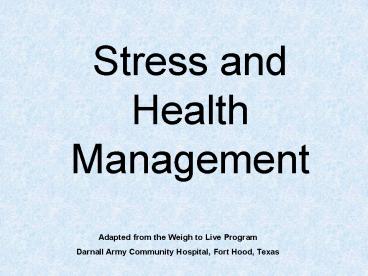Stress and Health Management - PowerPoint PPT Presentation
1 / 20
Title:
Stress and Health Management
Description:
Stress and Health Management. Adapted from the Weigh to Live Program ... Stress Management. Modify the Stressor. Change Your Perception or Belief About the Stressor ... – PowerPoint PPT presentation
Number of Views:34
Avg rating:3.0/5.0
Title: Stress and Health Management
1
Stress and Health Management
Adapted from the Weigh to Live Program Darnall
Army Community Hospital, Fort Hood, Texas
2
Stress and Health Management
- Goals
- To define stress
- To better understand the stress response
- To explore the consequences of stress on health,
productivity and well-being - To practice techniques and strategies to cope
more effectively with work and life stress
3
Definition of Stress
- A state of mental or physical tension.
- A reaction to anything that makes you adjust,
adapt or change. - What stresses you out?
4
What Are Your Major Work and Life Stressors?
WORK
HEALTH
FAMILY
FINANCIAL
OTHER?
5
Facts About Stress
- Stress is not simply what happens to us, it is
how we react. - We choose our attitude towards stress.
- Stress can be positive.
- People often react to stress in unhealthy ways.
6
Positive Reactions to Stress
- Alert
- Improved memory
- On Your Toes
7
Symptoms of Negative Reaction to Stress
- Trouble sleeping
- Irritability
- Accident proneness
- Tendency to misjudge people
- Forgetfulness
- Fatigue
- Headaches
- Loss of appetite or excessive eating
8
Stress Response(or Why do we have these
symptoms?)
- Sympathetic Nervous System (SNS)
- Epinephrine (Ep also known as adrenaline) and
norepinephrine (NEp) activate/arouse us during
stress - Immediate response to stressor (within seconds)
- Hypothalamic Pituitary-Adrenal Axis (HPA)
- Releases stored energy (glucose/fatty acids) to
deal with emergencies via glucocorticoids (e.g.,
cortisol) - Slower onset following stressor (within minutes)
9
Stress Response Continued
- The Stress Response Has a Specific Pattern
- Alarm
- Fight or Flight activation of the autonomic
nervous system (e.g., heart rate, blood pressure,
cortisol, etc.) - Resistance
- Immune suppression reaction, release of
endorphins and growth hormone - Exhaustion
- Exhaustion phase contributing towards stress
related illness and exacerbation of medical
conditions (e.g., memory impairment,
immunocompetence, accelerated aging of the brain,
coronary heart disease, breast cancer and
increase in free radicals)
10
Stress and HealthImportant Points
- Sickness and disease are not the same
- Stressors do not make you sick
- Stressors make you more likely to get diseases
that make you sick - Chronic stress exacerbates pre-existing
conditions, rather than, causing disease directly - There exists substantial individual variability
in response to disease
11
The Mind-Body ConnectionChronic Stress
- Problems Associated with Chronic Stress
- Cardiovascular (e.g., arteriosclerosis)
- Digestion (e.g., ulcers, decreased nutrient
absorption) - Bone (e.g., osteoporosis, stunted growth)
- Glucose (e.g., late onset diabetes)
12
AAA of Managing Stress
- Accept
- Alter
- Avoid
13
Coping with Stress
- Eliminate the stressor, if possible
- Alter your response to the stress
- Accept the stressor, if necessary
- And move on!
- Nurture the healthy, social relationships with
others important to you in your life. - Focus on your good qualities and accomplishments.
- Learn to say No.
- Be assertive.
14
Approaches to Preventive Stress Management
Change Your Perception or Belief About the
Stressor
Modify the Stressor
Practice Stress Inoculation Behaviors
Change Your Reaction to the Stressor
15
- If Id known I was gonna live this long, Id
have taken better care of myself. - Eubie Blake at 100
16
Health Habits Exercise
- Exercise
- Nutrition
- Hydration
- Adequate rest and sleep
- Preventive health/dental screenings
- No tobacco use
- Keep alcohol consumption in check
17
Action Plan
- List three stressors in your life which you would
like to eliminate. - Identify what you can change about these
situations and what you cannot. - List two methods of dealing with those stresses.
18
Coping with Stress Relaxation
- Mental Relaxation
- Meditation
- Breathing Exercises
- Visualization
- Self-Hypnosis
- Physical Relaxation
- Stretching
- Progressive Relaxation
- Yoga
- Massage
19
Determinants of Individual Health
- Genetic
- Social Circumstances
- Environment
- Medical Care
- Behavior/Lifestyle
- McGinnis et al., 2001
- 30
- 15
- 5
- 10
- 40
20
- Change before you have to.
- Jack Welch































